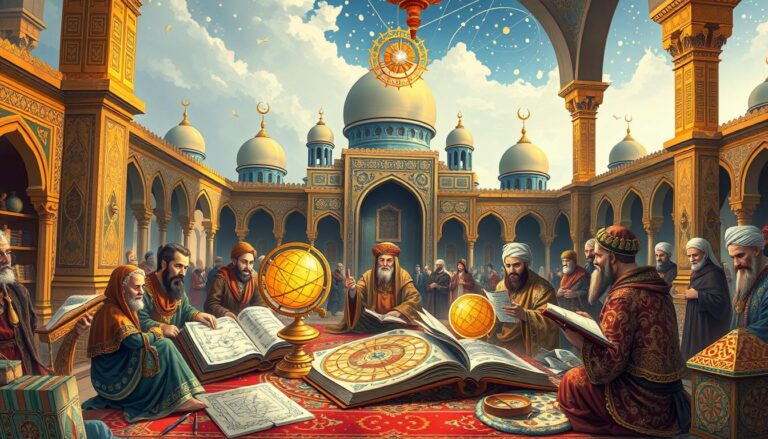What Is Islamic Philosophy? Key Concepts Explained
Ever thought about how old wisdom influences today’s ideas? Islamic philosophy is a mix of ancient wisdom from different cultures. It shows how ideas from Greece, Persia, and Islam have shaped our thinking.
This philosophy, called falsafa in Arabic, was a big deal in the Middle Ages. It mixed Aristotelian logic with Neoplatonic metaphysics, all within Islamic thought. This blend created two main areas: kalam, which looked at theology, and falsafa, which explored classical philosophy.
Islamic philosophy’s impact goes beyond the Islamic world. It helped keep and grow old knowledge during Europe’s Dark Ages. This helped spark the European Renaissance, shaping Western thought and literature.
Key Takeaways
- Islamic philosophy combines Greek, Persian, and Islamic traditions
- Kalam and falsafa are two main currents in Islamic thought
- It played a key role in preserving classical knowledge
- Islamic philosophy influenced Western thought significantly
- It explores concepts like existence, causality, and free will
The Origins and Foundations of Islamic Philosophy
Islamic philosophy started with a mix of Greek, Persian ideas, the Quran, and early scholars’ work. This blend created a new way of thinking that lasted for many years.
Greek and Persian Influences
In Baghdad, a translation movement began in the 8th and 9th centuries. The House of Wisdom, started in 832 AD, was key. It translated Greek texts into Arabic, introducing Muslim thinkers to new ideas.
Quranic Foundations
The Quran was a big source of inspiration for Islamic philosophers. It talked about creation, nature, and human life, leading to deep thoughts. The idea of tawhid, or divine unity, was central to their discussions.
Early Islamic Scholars
Early scholars were vital in shaping Islamic philosophy. Al-Kindi, known as the “Philosopher of the Arabs,” brought Greek ideas to Islam. He showed that Islam and philosophy could go together in seeking truth. Mu’tazilite theologians also used reason to understand Islam, starting big debates.
“Seek knowledge from the cradle to the grave.” – Prophet Muhammad
From 800 to 1300 CE, Islamic philosophy grew a lot. Different schools like Peripatetic and Sufism developed. This diversity led to a deep tradition of thinking that still affects Muslim thought today.
Major Schools of Thought in Islamic Philosophy
Islamic philosophy bloomed from the 8th to the 13th centuries. This period saw the rise of various schools of thought. The Mu’tazila emerged in Basra, Iraq, in the 2nd century of the Hijra. They emphasized reason and free will in understanding Islamic teachings.
Ash’arism came as a response to Mu’tazila. It aimed to balance reason with the teachings of revelation. This school became a major force in Sunni Islam, shaping theological debates for many years.
The Peripatetic school was influenced by Aristotelian philosophy. It focused on logic, physics, and metaphysics. Al-Farabi and Avicenna (Ibn Sina) were key figures in this tradition. They merged Greek philosophy with Islamic teachings.
Illuminationist philosophy was founded by Suhrawardi. It combined Neoplatonic ideas with Persian and Islamic mysticism. This school thrived in Eastern Islamic lands, influencing later philosophical developments.
“The ink of the scholar is more holy than the blood of the martyr.” – Prophet Muhammad
These schools greatly influenced Islamic intellectual discourse, literature, and spiritual practices. Their impact was not limited to the Islamic world. They also shaped European thought during the Renaissance through translations of Arabic philosophical works.
- Mu’tazila: Emphasized reason and free will
- Ash’arism: Sought balance between reason and revelation
- Peripatetic school: Focused on Aristotelian philosophy
- Illuminationist philosophy: Combined Neoplatonism with Islamic mysticism
Key Philosophical Concepts in Islamic Thought
Islamic philosophy explores big questions about reality, knowledge, and ethics. It shaped the Islamic philosophical discourse with complex ideas.
Existence vs Essence
The debate on existence and essence was key in Islamic philosophy. Ibn Sina believed essence came first, while Mulla Sadra thought existence was more important. This led to deep insights into reality and being.
Causality in Islamic Philosophy
Causality was a big topic for Islamic thinkers. Al-Ghazali questioned Aristotelian causality, doubting necessary connections between causes and effects. Averroes, however, supported the Aristotelian view, causing big debates on cause and effect.
Divine Attributes
Islamic philosophers tried to understand divine attributes. They came up with different ways to explain God’s qualities while keeping God’s unity. This led to deep discussions about God and His creation.
Free Will vs Predestination
The debate on free will and predestination was central. Different schools tried to balance divine decree and human choice. This touched on human responsibility and divine justice.
These key ideas in Islamic thought still shape today’s philosophical debates. They show the lasting impact of Islamic philosophy on big questions about existence, causality, divine nature, and human freedom.
Prominent Islamic Philosophers and Their Contributions
Islamic philosophy bloomed from the 8th to 14th centuries. This time, Greek ideas merged with Islamic teachings. This mix led to thinkers who changed intellectual history.
Al-Kindi, known as the “Philosopher of the Arabs,” lived from 800-870 AD. He translated Greek works into Arabic. This work set the stage for later thinkers.
Al-Farabi, born in 872 AD, was called the “Second Teacher” after Aristotle. He applied Aristotelian logic to Islamic studies. His book on reasoning showed how to use syllogisms in arguments.
Avicenna, born in 980 AD in Uzbekistan, went beyond earlier thinkers. He saw philosophy as a way to solve problems. His work on Being greatly influenced both Islamic and Western thought.
Averroes, born in 1126 AD, believed science and religion could work together. Known as “The Commentator,” he defended philosophy. His ideas shaped medieval Christian and Jewish philosophy.
- Al-Ghazali (1058-1111 AD) bridged philosophical and theological divides
- Ibn Arabi (1165-1240 AD) contributed profound mystical insights
- Ibn Khaldun (1332-1406 AD) pioneered empirical thought in social sciences
These thinkers explored God, existence, knowledge, and faith and reason. Their work still influences today. It sparks interest in conferences and studies around the world.
The Intersection of Islamic Philosophy and Literature
Islamic philosophy found its way into many literary forms. This created a rich mix of ideas and culture. It led to unique genres that mixed deep thoughts with engaging stories.
Philosophical Poetry
Philosophical poetry became a key way to explore big ideas. Omar Khayyam’s Rubaiyat is a great example. It turns deep thoughts into beautiful verses.
Ibn Sina, known as Avicenna in the West, also wrote philosophical poems. His poems tackled big questions about existence and the universe.
Allegorical Narratives
Allegorical narratives used stories to share big ideas. Ibn Tufail’s “Hayy ibn Yaqdhan” is a key work from the 12th century. It mixes fiction, philosophy, and poetry.
This work is like Daniel Defoe’s “Robinson Crusoe.” It shows how reason can lead to spiritual belief.
Sufi Mystical Writings
Sufi mysticism blended Neoplatonic and Islamic ideas with spiritual teachings. Ibn Arabi’s “Fusus al-Hikam” and Rumi’s “Masnavi” are examples. They explore unity, moral duty, and existence.
These writings have influenced not just Islamic thought but also Western literature. They’ve shaped English literature from medieval to modern times. Authors like Geoffrey Chaucer, John Milton, William Shakespeare, and Salman Rushdie have been influenced.
This cross-cultural dialogue has made literature richer. It challenges and supports old stories. It shows how different cultures are connected.
What Is Islamic Philosophy? Key Concepts Explained
Islamic philosophy combines ideas from Greece, Persia, India, and Islam. It’s a deep and varied intellectual tradition. It looks into big questions about reality, knowledge, and ethics.
At its heart, Islamic philosophy centers on a few key ideas:
- Tawhid: The unity of God
- Fitrah: Innate human nature
- Kalam: Islamic theology
These concepts shape Islamic thought and guide discussions. Early thinkers like Al-Kindi, Al-Farabi, and Ibn Sina started this tradition. They saw philosophy as understanding both divine and human things, aiming to be like God within human limits.
Islamic philosophy education mixes religious teachings with secular knowledge. It aims for complete growth, covering both physical and religious subjects. This method stresses discipline, reason, and personal growth.
The growth of Islamic philosophy keeps going today. New developments include:
- Revival of interest in classical texts
- Cross-cultural dialogues
- Multidisciplinary approaches in scholarship
Islamic philosophy education gives strong moral bases and values cultural diversity. Yet, it faces challenges in mixing old teachings with today’s educational needs.
The Influence of Islamic Philosophy on Western Thought
Islamic philosophy made a big impact on Western thought in medieval Europe. Scholars translated Islamic texts into Latin in the 12th and 13th centuries. This brought the ideas of thinkers like Avicenna and Averroes to European scholars.
This exchange of ideas deeply shaped Western philosophy. It was a turning point in the history of thought.
In Scholasticism, Islamic commentaries on Aristotle were key. Thomas Aquinas, a major figure in medieval Christian philosophy, was heavily influenced by Averroes. By the mid-13th century, Averroes’ commentaries were a must-read in European universities.
The Renaissance saw a surge in interest in classical learning. Averroes’ work was studied a lot in Italian universities. This was the peak of Islamic philosophical influence in Latin Europe.
Islamic philosophy changed many areas of study. This included natural philosophy, psychology, metaphysics, logic, and ethics.
“The corpus of Arabic philosophical texts translated into Latin was substantial, totaling 131 textual items.”
Islamic philosophy challenged and enriched Western ideas. It sparked debates that shaped Western philosophy for centuries. Today, top universities like Oxford, Cambridge, and Harvard still study and teach Islamic philosophy.
Contemporary Relevance of Islamic Philosophy
Islamic philosophy is still shaping today’s thought and philosophy. Scholars like Muhammad Iqbal and Fazlur Rahman have made big contributions. They focus on social justice and keeping learning alive.
They connect old Islamic teachings with today’s big issues. This helps us understand the world better.
Experts like M. A. Muqtedar Khan and Akbar S. Ahmed tackle important topics. Khan held the first Islamic Philosophers conference, talking about reform and world relations. Ahmed works on how Islam fits into global issues, pushing for better understanding.
The Nahda movement, from 1850 to 1914, was a key moment. It tried to mix European ideas with Islamic culture. Today, scholars like Javed Ahmad Ghamidi and Feisal Abdul Rauf aim to bring cultures together and update Islamic teachings.
Islamic philosophy gives us great ideas for talking across cultures and in global discussions. Shabbir Akhtar is working to bring Sunni Islamic philosophy into the Western world. This shows Islamic philosophy is still very important for solving today’s big problems.
Source Links
- Islamic philosophy – Routledge Encyclopedia of Philosophy
- Islamic philosophy – New World Encyclopedia
- Islam, concept of philosophy in
- Arabic and Islamic Philosophy of Religion
- Islamic philosophy
- Islamic philosophy | World Literature I Class Notes | Fiveable
- Islamic Philosophy – (Islamic World) – Vocab, Definition, Explanations | Fiveable
- Basic Concepts of Islamic Philosophy-Introduction
- Islam – Philosophy, Theology, Mysticism | Britannica
- Five Islamic Philosophers Every Muslim Should Read
- Islamic Philosophy – (Intro to Comparative Literature) – Vocab, Definition, Explanations | Fiveable
- 3 Islamic Thinkers Who Shaped Islamic Philosophy
- The Influence of Islamic Philosophy on English Literature
- Ibn Tufail’s Hayy ibn Yaqzan – (Islamic World) – Vocab, Definition, Explanations | Fiveable
- The meaning and concept of philosophy in Islam
- Exploring Islamic Philosophy: Unveiling its Background, Key Concepts, Originator, Strengths, and Limitations
- Influence of Arabic and Islamic Philosophy on the Latin West
- Islam – Western Philosophers | Britannica
- ‘Impact of Islamic philosophers on western philosophy is huge’
- Contemporary Islamic philosophy
- Islamic philosophy, modern







